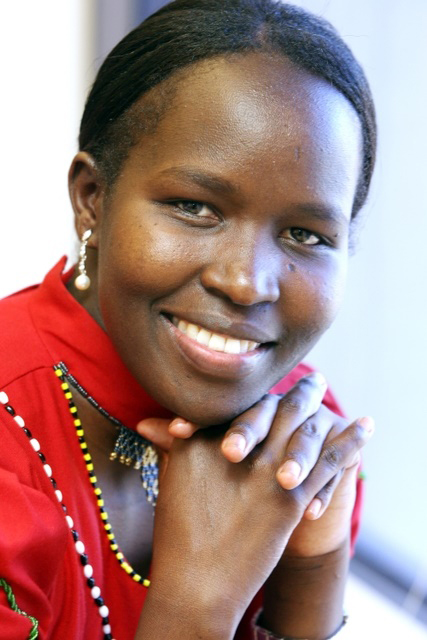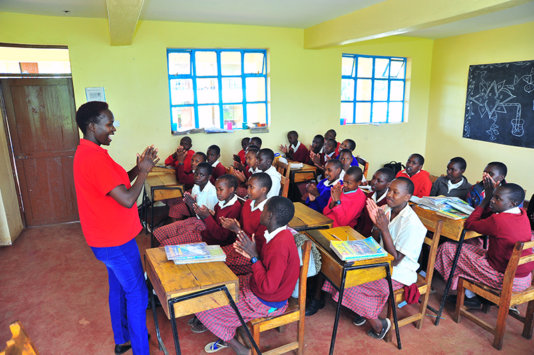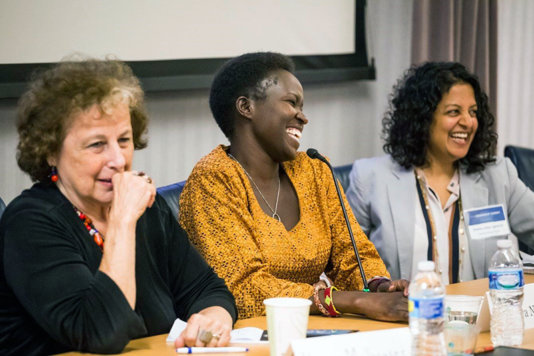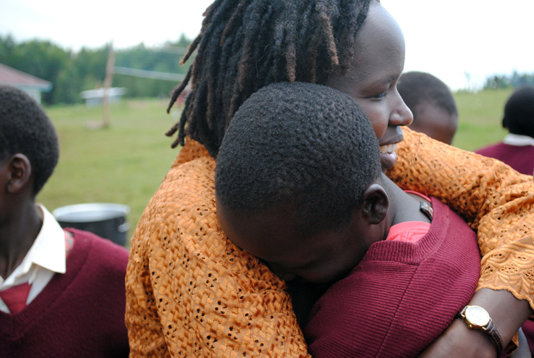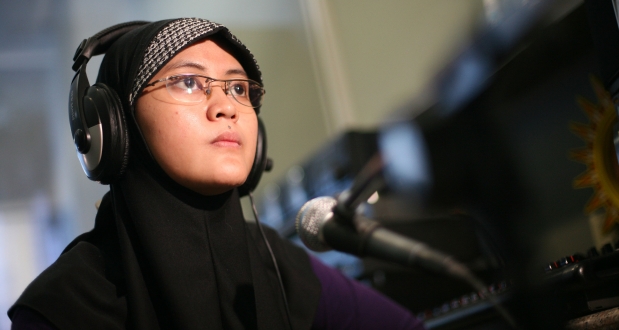- About
- Topics
- Story
- In-Depth
- Picks
- Opinion
- News
- Donate
- Signup for our newsletterOur Editors' Best Picks.Send
Read, Debate: Engage.
| November 04, 2016 | |
|---|---|
| topic: | Women's rights |
| tags: | #circumcision, #education, #Kakenya Center for Excellence, #Kakenya Ntaiya, #Kenya |
| located: | Kenya |
| by: | Bob Koigi |
Statistics show that approximately 200 million girls and women alive today have been undergone female genital mutilation. In her native Maasai community in Kenya where female circumcision is prevalent, only 11 per cent of girls complete their primary school education.
Dr. Kakenya Ntaiya knows this all too well having lived the experience herself. Her obsession with education set her on a conflict path with her father who wanted her to be circumcised and married off. She made a compromise with her father, that she would undergo circumcision on the condition that her father allowed her to continue with her high school education. Her efforts paid off.
Now with a doctorate degree in education and having received global recognition, including being honoured as a top 100 CNN hero in 2013, Dr. Ntaiya is investing in empowering girls in her rural community to access education.
The Kakenya Center for Excellence is her flagship effort. The center is helping more than 150 girls access education and protecting them from harmful traditional practices like FGM.
FairPlanet: How did you find your passion for fighting against circumcision and for child education?
Dr. Kakenya Ntaiya: I grew up in a small Maasai village in rural Kenya called Enoosaen. In my community, girls’ education was never a priority. I had many responsibilities as a young girl: gathering firewood, fetching water from the river, cleaning the house, cooking for the family, and caring for my younger siblings. My father was a police officer and frequently away from home for long periods of time. While he was gone, my mother worked hard to take care of our farm. When my father would come home, he wasted all our money on drinking with his friends. He would beat my mother. This behavior was considered acceptable in my culture. Women could not own property and had no rights.
Yet these aspects of the culture never seemed right to me, and I wanted a different life than my mother. When I was 13 years old, my parents began to talk about the ceremony that all girls in my village went through at puberty: female genital mutilation (FGM). However, we didn’t call it by this name. It was celebrated as a rite of passage into womanhood and signaled readiness for marriage.
I decided to do something that was unheard of in our culture. I told my father I would only go through the ceremony if I could continue with school afterward, rather than getting married. It was so socially important to him to have a daughter who was cut that he agreed to the arrangement. I went on to high school and later, I became the first girl from my community to go to the U.S. for college. To do this, I had to earn the support of all the male elders in Enoosaen. They made me promise to use my education to benefit the community. It was from the U.S. that I began the work of founding the Kakenya Center for Excellence. This was my way of fulfilling that promise to my community elders. I felt that the best way I could help my village was to create a safe, nurturing place to educate its daughters.
What happened after you made this decision?
It was in my college years that the experience of undergoing FGM really began to shape the course of my future. When I came to the U.S. to study, I learned for the first time that female genital mutilation is against the law in Kenya, and that 3 million girls are at risk of undergoing it. I learned that my mother did in fact have the right to own property, and did not have to be beaten by my father.
The injustice of the way women and girls in my community were treated became clear to me. Mothers are blamed when their daughters are raped while walking to school or if they get pregnant while unmarried. For all of these reasons, I felt that I needed to take action so that other girls and their families could be educated about these injustices. I wanted more girls to have the opportunity to grow their own dreams for the future and then pursue them with confidence, because I had learned that investing in girls benefits the entire community.
But it also needs the entire community to make it happen. Who supported and inspired you?
I was inspired by mother because I knew things could not continue the way they were. I knew I personally wanted to get an education to change my own life and to be able to support my mother. After receiving this education, I felt a responsibility to also change the lives of the girls back home in my community. The girls continue to be my biggest inspiration. When I listen to them, help them learn and hear their goals for themselves, I can see the impact of the work we are doing, and it is inspirational.
Was that the reason, why you became a teacher?
At first, I just wanted a job to make a living to be able to provide for my mother and support myself. I wasn’t thinking yet about a school for girls. It was more about how I was going to make a living and get by. That changed though, because when I learned that I had a chance to go to college, I had to go door-to-door to people’s homes in my community and talk to them about helping me achieve my dream. I’d never done that before and it really exposed me to the realities of living in my village. I realized that it wasn’t just my home that was struggling to get by; even the homes I thought were doing well were still very, very poor. I’d see these girls going to school with me one day and being married off the next. I felt bad about this and knew that if I could make a difference, I would. Then I went to college and realized the scope of the problem; it’s not just my village, it’s the whole world. I needed to do something and I knew I should start at home. That is why I began KCE.
Tell us about the Kakenya Center for Excellence.
I started KCE in 2009 and we opened the first all-girls primary boarding school in 2009. I knew that to change the lives of these girls, they had to get a quality education. This meant they had to be safe, well-nourished and not be forced to undergo FGM or child marriage. Our boarding school accomplishes all of these things—our test scores are some of the highest in the county and 100% of our girls have avoided FGM and early marriage. Their families are proud of their accomplishments, and so are they. Next year, our first class of girls will go on to university. We’ve also started two other programs. The Health and Leadership Training program brings our programming about sexual and reproductive health, empowerment, and leadership to youth who don’t attend our school. We’ve reached over 5,000 girls and boys this year. We also have the Network for Excellence, which provides scholarships and mentorship to our alumnae who’ve moved on to high school.
Your engagement means fundamental changes of the culture. That causes probably a lot of resistence - and maybe even threats against you?
Social and cultural change takes time and can be a road fraught with opposition and setbacks. We are working to change practices that have been in place for many generations. I have experienced plenty of pushback, and this can be discouraging. But we have come a long way already, and the change that is taking root in the community is undeniable. Over time, we have earned the support of many influential local figures who initially were against the idea of building a school for girls. They felt that a boys’ school would benefit the community more. Our girls have proven that investing in girls’ education is worthwhile. Their successes have become a source of pride in the community, and that has silenced many who used to oppose our work.
What would you define as the KEC's core success in the last years?
Our work at KCE is effective in ending practices like FGM and early forced Marriages, because we have a holistic and girl-centered approach. In addition to providing these girls with a top quality education, we also teach them about leadership, health and their rights. We also involve their families and the whole community. This way, every aspect of the girls’ life is improved and the entire community grows and benefits.
... and the rewards for your personal life - What would you want to be remembered for?
The most rewarding thing is to see the transformation in the girls whose lives are changed by our boarding school. It is so powerful and moving to see a girl who has never been told that she has worth transformed into a confident, determined young lady who believes that she deserves to create her own story. Our girls want to become lawyers, doctors, politicians, and educators; they all want to make a difference. This gives me great pride and hope for future.
I want to be remembered for creating leaders –empowered and inspirational women leaders.
Is the world doing enough for the girl child especially in developing countries?
The challenges facing girls around the globe today have gained greater visibility in recent years, including as part of the United Nations’ Sustainable Development Goals. I am pleased to see increasing awareness about these issues. Still, far too many girls are still being held back from their full potential because of harmful cultural practices. According to UNICEF, while the exact number of girls and women worldwide who have undergone FGM is not known, at least 200 million girls in 30 countries in Africa, the Middle East, and Asia have been subjected to the practice. Approximately 15 million girls marry before the age of 18 each year. Progress is being made in eradicating these practices, but it’s happening slowly and unevenly across regions.
Do you think we as the world can achieve Sustainable development goal number 5 on gender equality by the year 2030?
There is much work to be done. It will take everyone’s dedication and inspiration. It is important that those who can give make a commitment to causes like ours. Everyone can spread the message, which is why it is important to talk to friends, family, colleagues—everyone—about the issues girls face worldwide and how important it is that things change.
Can discrimination against girls and practices like FGM be eliminated especially considering they are entrenched in many cultures in Africa?
Of course. I see peoples’ perspectives change on practices like FGM and child marriage all the time in my work. Parents and communities want the best for the children—it is important to talk about why these practices are not actually good for the girls, their families or communities. This isn’t easy, of course, but it can be done and is being done.
What are your plans going forward?
My dream is to see every girl free of FGM and child marriage, receiving a quality education and achieving her dreams. Through KCE, that dream is starting to come true, but there are still many more girls to reach. Our organization is expanding over the next few years to reach even more young people and communities. There is still plenty of work to be done!
By copying the embed code below, you agree to adhere to our republishing guidelines.
